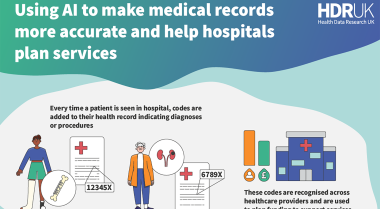Overview
Understanding the effectiveness and uptake of the COVID-19 vaccines in the population was a vitally important area of study as the rollout progressed. This was particularly the case for the most vulnerable people, including healthcare workers. Gathering national data allowed researchers funded by HDR UK to show how the vaccines waned over time and the factors that influenced uptake.
The challenge
Healthcare workers were among the most exposed people to COVID-19 during the vaccine rollout, which was the main reason why they were prioritised. However, clinical trials and later studies mostly examined the impact of the vaccines on the general population, who would not have faced the same risks. The few studies of healthcare workers that have been completed have either relied on self-reported data, which can be unreliable, or used small samples.
The solution
Researchers supported by HDR UK analysed data from almost 83,000 healthcare workers in Wales for vaccine uptake and infections post-vaccine. Studying healthcare workers also had the benefit that they are a relatively homogeneous group of healthy working adults, making it more straightforward to analyse. The workers were also regularly tested for COVID-19, so the data on infections is more reliable than for the general population.
Impact and outcomes
The study, published in the journal Vaccine, showed that vaccine uptake was high and had reached 90 per cent by 30 September 2021, although this figure was lower in more deprived areas. In addition, younger, more deprived, minority ethnic staff and those in non-patient-facing roles were least likely to be vaccinated. Medical and dental staff were 1.5 times more likely to get vaccinated than nursing and midwifery staff.
The researchers also found that the Pfizer-BioNTech vaccine was 86 per cent effective at preventing infections two weeks after the second dose. However, this effectiveness dropped to 53 per cent after 22 weeks, supporting the policy of introducing booster doses after a few months. This effect was the same across the different groups studied.
No other study has looked at vaccine uptake and effectiveness across different healthcare occupations. The team are now looking to further analyse the data to understand the impact of the booster vaccine programme in this group.
Dr Stuart Bedston from Swansea University, whose work on this was funded by HDR UK, said:
“Healthcare workers are an incredibly exposed group and if there are any issues around them, we should be working to understand and help fix them.”
Impact committee
The Impact Committee identified this as a valuable study that made good use of collaboration to analyse this large-scale data. They felt that this work would have a substantial impact on our understanding of the range of factors that influence vaccine uptake.
Read the full paper




